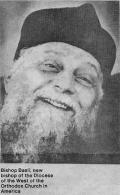"We have our roots in Russia, in Romania, in Serbia, but our intention is to change it into an English-language church, gradually. We see ourselves as missionaries here. We are all shedding faith."
The dark, scrupulous eyes of the Right Rev. Basil (Rodzianko), bishop of San Francisco and the Diocese of the West of the Orthodox Church in America, examine the questioner as a scholar examines his manuscript -- to see if his meaning has registered.
He smiles. "We have a child that is being born directly from the granny. That is why it is so difficult. We have a gap between the younger generation and mucher older generations."
The tall, gray-bearded man in the flowing black cassock who presides over the largest geographical region of the decade-old offshoot of the mother Orthodox Church has traveled a long, arduous road from his native Dnepropetrovsk, from the privileged boyhood of a grandson of Michael Rodzianko, president of the Douma (parliament) in the waning reign of Czar Nicholas II.
In the revolution of 1917, constitutionalist Rodzianko was caught between the right and the left. The family was forced to flee to Yugoslavia where Bishop Basil grew up, graduated from the University of Belgrade and pursued post-graduate work in England, becoming a priest in the Serbian Orthodox Church in 1941.
War raged all about, but "the shepherd couldn’t leave his flock, could he?"
There, as Father Vladimir, confessing an allegiance to gospel above man-made law, he was sentenced by the Communists to eight years in prison. He was beaten, starved and for two years shuttled from prison to prison until a rift between Soviet Premier Josef Stalin and Yugoslavian President Joseph Broz (Tito) created a political climate in which the Archbishop of Canterbury could intervene successfully to gain his release.
He went to Paris, then to London where he spent the next year, including additional work at Cambridge. He broadcast weekly religious programs into Russia via the BBC.
There his wife died, and an 18-year-old grandson was killed in a mysterious auto accident. He too had his car tampered with, but escaped injury.
With the death of his wife, he took the name Basil and the monastic vows. He was invited to the United States and consecrated bishop last year, serving for a time as bishop of Washington, DC, before his election last October as administrator and spiritual leader of a diocese that extends from Denver to the Alaskan and Mexican borders.
"The real members of the church are those who took communion this morning," he smiles. But perhaps 20,000 members inhabit the diocese. He notes that "among all religious groups, the Orthodox Church in America is the fastest growing. We have added 100 new parishes in the last 10 years."
His Beatitude Theodosius, archbishop of Washington, D.C., and metropolitan of America and Canada, during the elaborate installation ceremonies for Bishop Basil at Holy Trinity Cathedral last week, noted the "mission in America implies the effort of understanding America and the American religious psychology; it means to discern the profoundly ‘non-orthodox’ roots of our society, it involves bearing the pain of being misunderstood or understood in an alien way.
"Most of all, being Orthodox in America includes a love of America, a love that goes beyond patriotism," and he repeated the church’s concern for civil rights: "When we look beyond the shores of the American continent we see multitudes of believers suffering for their faith, deprived of their elementary human rights, subject to external control and pressures."
The church’s defense of human rights and the traditional precepts of family, denunciation of abortion and "deviant" habits, was reiterated in a council of the Orthodox Church in Detroit last November and was taken by Bishop Basil to the Madrid Review Conference last December.
In an unprecedented one-hour confrontation with Leonid Ilychev, Soviet deputy foreign minister, Bishop Basil presented the case against Soviet practices of the Committee for the Defense of Persecuted Orthodox Christians and his own church.
He carried the plea for human rights personally to the representatives of each of the 35 attending nations. He notes "we are not political, but we consider violation of human rights, the right to worship and to be treated equally in all ways is a violation of human destiny. I told them that the issue is really serious from the point of view of millions of Americans. I think they understood."
The new church keeps Bishop Basil on the move. He notes, smiling, "I’m constantly in the air. But the first thing I would like all my priests to do is to set up adult education classes and youth classes as well. We all have to learn, or be reminded of those things, which tend to be pushed aside in the daily struggle.
"There is not enough time in our life to study the depth of Christianity, especially because our brothers in Communist countries are denied that. The denial of that right; that is why I went to prison."
To gain admission to the United States, in fact, Bishop Basil was compelled to return last year to Backa Topola, site of his imprisonment, to obtain a certificate to verify that he had not been incarcerated because of a crime against person or property.
Mayor Feinstein hand-delivered a proclamation of welcome to Bishop Basil, who exudes a quiet optimism about the church’s ability to draw in the younger generation and who notes that he is continuing to tape messages for broadcast by the BBC to former countrymen behind the Iron Curtain.
By Russ Cone
San Francisco Examiner, Tuesday, February 17, 1981, p. D2
